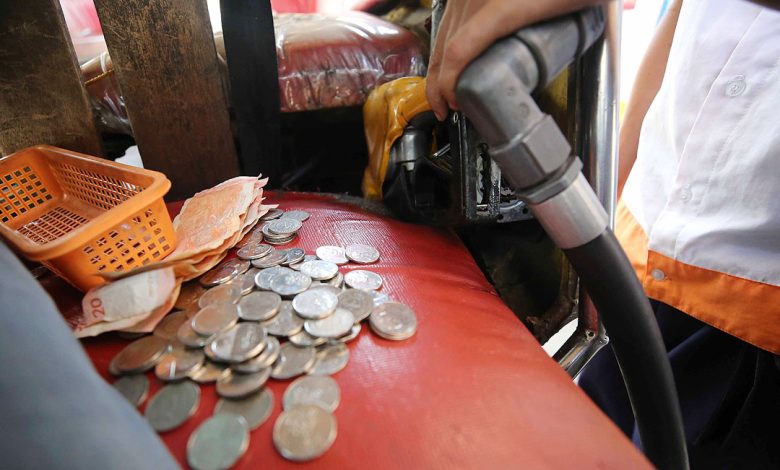Inflation should be Marcos’ top priority — NEDA chief

A man prepares his payment at a gas station in Pasay City. — PHILIPPINE STAR/ RUSSELL A. PALMA
THE NEXT ADMINISTRATION should make it a top domestic priority to fight high inflation, according to Socioeconomic Planning Secretary Karl Kendrick T. Chua.
“Since we are doing relatively well on the economic opening as evidenced by the Q1 data, the immediate priority is to address inflation, especially those that affected people the most, food prices,” Mr. Chua, who also heads the National Economic and Development Authority (NEDA), said at a briefing on the first-quarter economic data on Thursday.
The Philippine economy grew by a better-than-expected 8.3% in the first quarter.
Inflation has accelerated in recent months, threatening to dampen consumer spending and hurt recovery prospects. Inflation surged to an annual 4.9% in April, the highest in more than three years due to soaring food and energy prices.
Economists have earlier identified inflation as a major “headache” for the new president. Ferdinand R. Marcos, Jr. is poised for a landslide victory in the presidential elections.
The Duterte administration has formed a presidential transition committee that will ensure a peaceful and orderly transfer of power. Mr. Chua is part of the committee, along with Finance Secretary Carlos G. Dominguez III, Budget Secretary Tina Rose Marie Canda, and Foreign Affairs Secretary Teodoro Locsin, Jr.
Aside from inflation, Mr. Chua said the incoming administration should maintain a “responsible” and “prudent” fiscal policy, as well as ensure policy continuity.
“Policy continuity is the most important I think during this transition and we stand ready to have a dialogue with the transition team of the new administration to discuss the details,” he said.
The NEDA chief said the Duterte administration has enacted many economic reforms that should be retained — not reversed, such as the tax reform, rice tariffication and economic liberalization laws.
In the immediate term, Mr. Chua said the next administration should immediately allow the resumption of face-to-face schooling to address the learning loss and impact on future productivity of Filipino children.
“Our main concern is the future productivity of our children, and NEDA estimated that closing schools for two years cost us P22 trillion over the lifetime of the students,” he said.
Schools have been shuttered since the start of the pandemic in March 2020, although limited face-to-face pilot classes have been allowed in some areas with low number of coronavirus disease 2019 (COVID-19) infections.
The NEDA estimated that every week of school closure costs the economy P12 billion pesos.
TAX REFORMAt the same time, Mr. Chua said the next administration should seriously pay attention to the next set of tax reforms in order to fund the infrastructure program, including “raising our tax revenues if needed to fund important investment in infra and capital development.”
He is still hoping the outgoing Congress will pass key measures such as the Livestock Development and Competitiveness Bill, and two crucial tax reform bills, Package 3 on Property Valuation and Package 4 on Passive Income.
“I hope they can be pursued with haste,” he said.
Mr. Chua also identified four medium-term priorities for the next government — building smart infrastructure, pursuing innovation, addressing climate change and improving regional equity.
The NEDA chief urged Mr. Marcos to share his economic agenda and plans to alleviate any concerns raised by investors and economists.
Several economists have expressed apprehensions over the lack of details of the presumptive president’s economic policies and plans.
Mr. Marcos on Wednesday evening said he will choose economic managers that will help drive the Philippine economy’s recovery from the pandemic.
“I am also guided by the critical areas that we talked about during the campaign. So that’s what we are prioritizing. Of course, it’s the economy, prices, it’s the price of energy, lack of jobs, education, infrastructure,” he was quoted as saying by Bloomberg. — Tobias Jared Tomas




